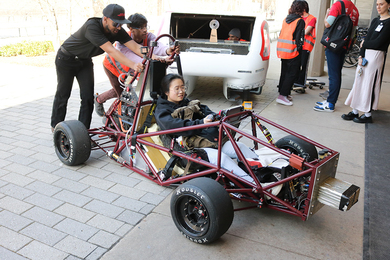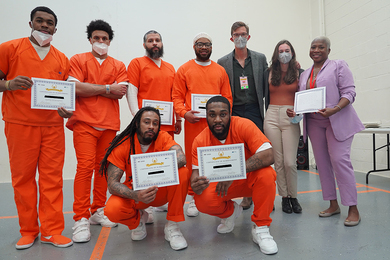An April colloquium on "National Security, Civil Rights and Politics: Lessons Learned from the Wen Ho Lee Case" explored the wider implications and deeper roots of the indictment and imprisonment of Dr. Lee, a Taiwanese-American nuclear scientist accused of espionage on behalf of China.
Dr. Lee, who worked at Los Alamos National Laboratory in New Mexico, was arrested in 1999 and charged with 59 counts of mishandling sensitive information. He spent 278 days in solitary confinement before being released in September 2000 with an apology from presiding US District Judge James A. Parker.
The mission of the five-member panel was to glean educational lessons from the highly publicized case, said Institute Professor Sheila Widnall, moderator. The colloquium topic was of "broad interest to the MIT community," noted Dean for Undergraduate Education Robert P. Redwine. He thanked Roger Hu, a graduate student in electrical engineering and computer science, for his "personal interest and drive" in organizing the event, held in Rm 10-250 and attended by about 150 people.
Panelist Philip Morrison, Institute Professor and professor of physics emeritus, characterized the sight of Wen Ho Lee, a "slight man in shackles," as an image with political purpose whose roots lay in "Cold War I," the 40-year US-USSR standoff that ended in 1986.
"One lesson I have learned is that there is no phenomenon of political life so important as war against a named power so that everything can be named a part of the Cold War. When an espionage story arrives on the front page, there is a deep political reason," he said. "The spy story we saw, with all its baroque not to say barbarous elements, was there for political purposes."
But the Lee case, he said, did not have to fuel Cold War II -- a standoff between the United States and China like the one between the US and USSR -- despite its potential for provoking anti-Chinese sentiment and policy.
"This is a long-term danger we must oppose. We don't have to give in to this 'mysterious enemy,'" Professor Morrison said. He also noted differences between US-Soviet relations and US-China relations that made a Cold War II scenario unlikely.
Panelist Vernon Loeb, national security correspondent at the Washington Post, described himself as a "representative of the press decrying press leaks. In Wen Ho Lee's case, the leaks were damaging to him, to the nation, to the Department of Energy and to the national labs. Without the leaks, Wen Ho Lee would never have been charged with 'faux espionage.' No one in history had ever been charged with doing what he did. Under the pressure of the glare of publicity, the FBI could not add up facts and draw any conclusion other than espionage."
Juliette Kayyem, executive director of the Executive Session on Domestic Preparedness at Harvard's John F. Kennedy School of Government, suggested that the educational lesson to be gleaned from the Lee case was the likelihood of more such cases, thanks to a change in the Foreign Intelligence Surveillance Act (FISA) that widens the justification for electronic surveillance to include an individual's actions of 20, 30 or 40 years ago.
The law's new version generally feeds the fears of "foreign threats, stateless persons, terrorists and spies" that have "captivated the national imagination," she said.
The FBI's first requests to place Mr. Lee under surveillance were denied by the FISA court as inadequate, Ms. Kayyem said. Once FISA was amended in 2000, it "unleashed the FBI."
Ms. Kayyem suggested that Congress be banned from "fixing" anything for two years following an event like the Lee case; that the Justice Department and the FBI "go after their own people for leaking"; and that the "communications gap between the civil liberties community and the national security community" be addressed.
Paul Watanabe, co-director of the Institute for Asian-American Studies, and professor of political science at the University of Massachusetts in Boston, focused on the political uses of the Lee case to "discipline those who think they have it made and to generate uncertainty and vulnerability in the Asian-American community."
He outlined a pattern of anti-Asian racial sterotyping and of prejudice. "This notion of perpetual foreignness has political, economic, cultural and social exclusion [built into it]. But what kind of society do we want to secure?" he asked.
Steven Aftergood, director of the Project on Government Secrecy at the Federation of American Scientists, used his time to credit the few heroes in the Wen Ho Lee case. He noted the examples of "a handful of senior independent scientists; Mr. Lee's energetic, competent attorneys; Judge Parker, who reconsidered all the evidence, changed his mind, released Mr. Lee and apologized; and two newspaper reporters, including Mr. Loeb. The Internet was kind of a hero, too, in that it allowed supporters to strategize and fundraise for Mr. Lee's defense."
Mr. Aftergood, summarizing the educational lessons of the case, said, "The government can get it very badly wrong. We need to strengthen the corrective mechanisms for when the government goes astray. And we must not prejudge an individual's case based on what the government or the media say."
A version of this article appeared in MIT Tech Talk on May 2, 2001.







